Under Her Wing
Author
Published
10/3/2025
Erica Sawatzke’s Oakdale Farm in Kensington holds more than 150 years of history. In 1866, her great-great-great grandfather Ole Sarsland, an immigrant from Norway, homesteaded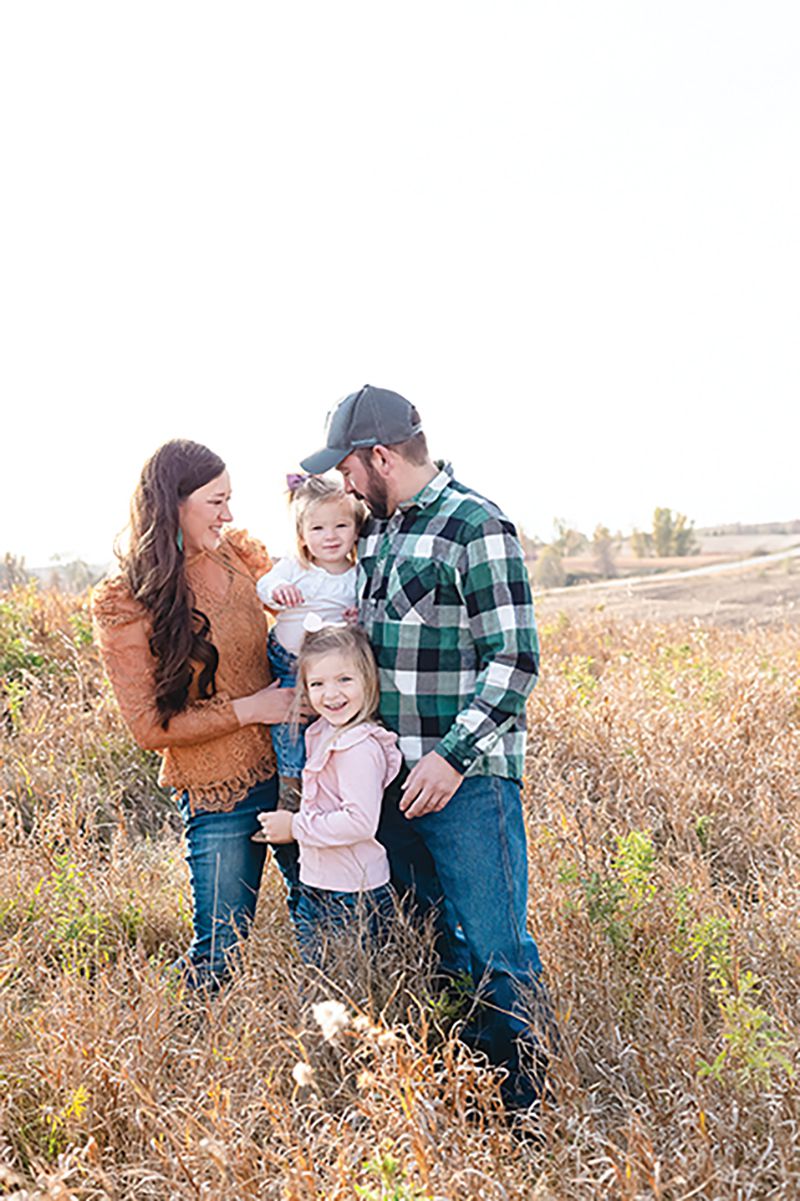 the farm. After initially settling in Wisconsin in 1848 and later fighting in the Civil War, Sarsland moved west to double his farm size following President Abraham Lincoln's signing of the Homestead Act, which allowed any adult citizen (who had never fought against the United States government) to claim 160 acres of surveyed public land for a small filing fee.
the farm. After initially settling in Wisconsin in 1848 and later fighting in the Civil War, Sarsland moved west to double his farm size following President Abraham Lincoln's signing of the Homestead Act, which allowed any adult citizen (who had never fought against the United States government) to claim 160 acres of surveyed public land for a small filing fee.
“We had the original barn that he built here until I was about 10,” says Sawatzke, a sixth-generation farmer. “It took 11 years to build because, at that time, they had to travel by oxen and wagon all the way to St. Cloud [for materials]. The tenacity of those early settlers and what they went through to build what we have now is just amazing.”
Sarsland’s daughter Julia, Sawatzke’s great-great grandmother, first introduced turkeys to the farm. Each April, she would hatch and raise the turkeys, then butcher and sell them in the fall to make a supplemental income for the family.
 Erica Sawatze's great grandfather noted hatches on the wall's wooden planks.
Erica Sawatze's great grandfather noted hatches on the wall's wooden planks.
“Each generation after that really learned to love turkeys,” says Sawatzke. “My great grandpa used to hatch out turkeys in the basement of the house that I now live in. He would write down all .jpg) Original railway tickets for shipped turkey eggsof his hatches up on the wall on wooden planks, and I’ve kept some of those. I have railway tickets from when my family would ship out turkey eggs to people who wanted to hatch them out. We like history here, and we’re pretty fortunate that we still have a lot of that to carry on.”
Original railway tickets for shipped turkey eggsof his hatches up on the wall on wooden planks, and I’ve kept some of those. I have railway tickets from when my family would ship out turkey eggs to people who wanted to hatch them out. We like history here, and we’re pretty fortunate that we still have a lot of that to carry on.”
Turkey Farming Today
Throughout its history, Oakdale Farms has participated in various stages of turkey farming—from maintaining breeder flocks that produce turkey eggs to sell to other farmers to raising market turkeys for meat production. But in 2020, Sawatzke and her family decided to focus on market turkeys alongside farming corn and soybeans. They receive baby turkeys, called poults, from their hatchery when they are a day old. The poults are placed in a 93 degree brood barn, where they live for four weeks before being moved into one of Sawatzke’s bigger barns. There they continue to grow until they reach 13 to 15 pounds around 12 to 13 weeks of age, at which point they are sent to market for processing.
The year-round operation raises roughly 132,000 turkeys annually, with flocks of turkeys being sent to market every six to seven weeks. Along with a small group of other turkey farmers, Oakdale Farms partners with Ferndale Market in Cannon Falls to sell its turkey meat.
“At the end of a flock when I send them to market, if I’ve done better than the previous flock, it’s really rewarding to know that you raised a healthy flock and they performed well,” says Sawatzke.
Joining the Family Business
Though Sawatzke grew up on the farm, she initially wasn’t sure if farming was the path she wanted to pursue. For a while, she planned to become a large-animal veterinarian. “I was always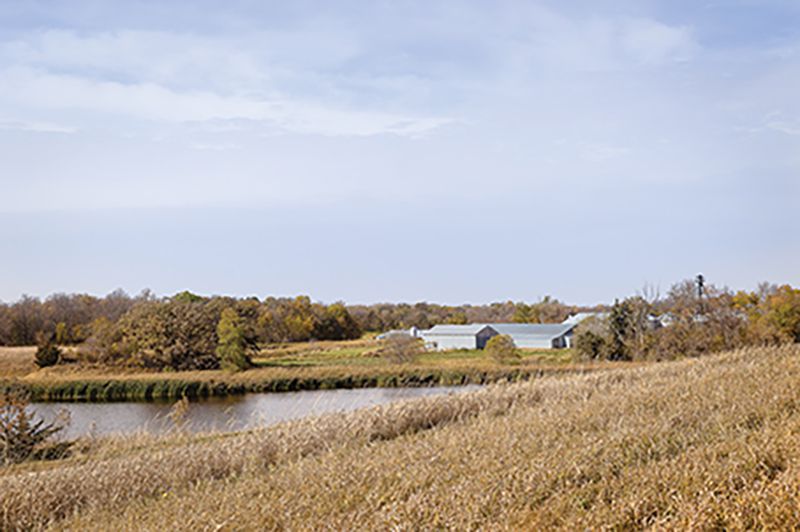 Oakdale Farm in Kensington involved in the farm as a kid, and I loved it. I knew that I didn’t want to lose my tie to the farm ... but my dad never pushed that on us growing up,” says Sawatzke, referring to herself and her two sisters, both nurses. “My dad felt like he wanted us to make that decision on our own if that’s what we truly wanted.”
Oakdale Farm in Kensington involved in the farm as a kid, and I loved it. I knew that I didn’t want to lose my tie to the farm ... but my dad never pushed that on us growing up,” says Sawatzke, referring to herself and her two sisters, both nurses. “My dad felt like he wanted us to make that decision on our own if that’s what we truly wanted.”
While working at the Minnesota Turkey Growers Association after college, Sawatzke had a revelation. “I realized I could have this rare opportunity to come home and take over the family farm,” she adds. “There was nobody that was interested, and we just have such a strong history here. There’s so much family legacy that I didn’t want to lose.”
Sawatzke and her husband Eric got married on the farm in August 2016 before moving there to start farming full time in March 2017. Today, Sawatzke primarily farms alongside her dad, Dana, with help from Eric—a high school agriculture teacher—and their two young daughters, Emma and Charlotte.
Overcoming Obstacles
Sawatzke finds strength in working with her family, relying on their close-knit bond to help her through difficult situations. “My family and I have been through a lot of really hard things, and it’s rewarding to know that we have always supported each other through those things,” she says. “As long as we work together, we can get through anything.”
In addition to multiple wind events taking parts of their barn’s roof over the years, Eric battled and overcame leukemia shortly after the birth of their first daughter in 2020. Then came Black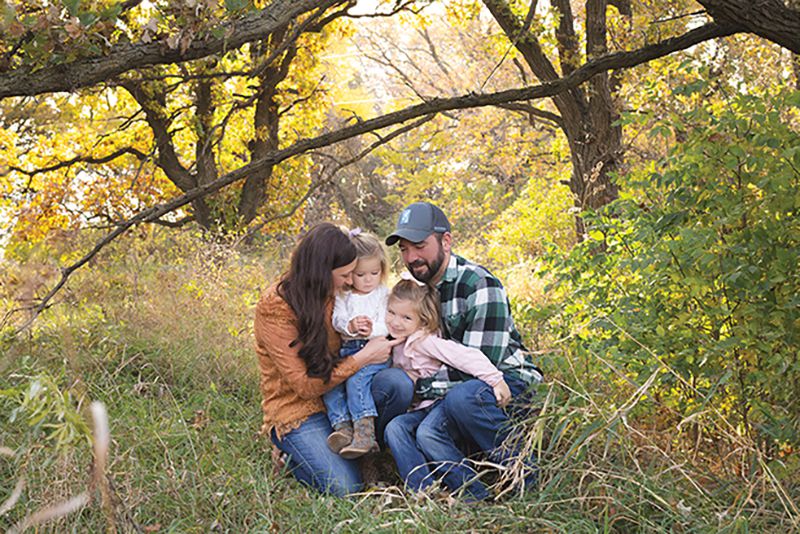 Friday.
Friday.
The day after Thanksgiving in 2023 (aka Black Friday, customarily recognized as the start of holiday shopping season), Sawatzke’s flock tested positive for highly pathogenic avian influenza, more commonly known as the bird flu. They lost 15,000 turkeys due to the disease.
“Black Friday has a new meaning to us,” says Sawatzke. “As a farmer, you’re trying to navigate through responding to the disease because you have to clean up your farm and there’s an entire process for that. But there also is a lot of grief that comes with that, too. Watching animals suffer isn’t easy.”
Once avian influenza was confirmed on their farm, Sawatzke and her family had to compost all the birds, manure and litter inside of the barn before it was cleaned and disinfected from top to bottom. The barn was then retested to make sure no traces of the disease remained. In total, the Oakdale Farms operation was down for about 10 weeks."
You’re in the moment, but you’re also having to plan for tomorrow and the next week, two weeks down the road, a month down the road,” says Sawatzke. “Your world around you is spinning because you have to deal with and manage the devastation that’s right in front of you, but then you’re also trying to prepare for the future.”
 Sawatzke speaking about avian influenza in Washington D.C.While Sawatzke says it was an experience that she wouldn’t wish upon anybody, she’s now educating others about avian influenza through her
Sawatzke speaking about avian influenza in Washington D.C.While Sawatzke says it was an experience that she wouldn’t wish upon anybody, she’s now educating others about avian influenza through her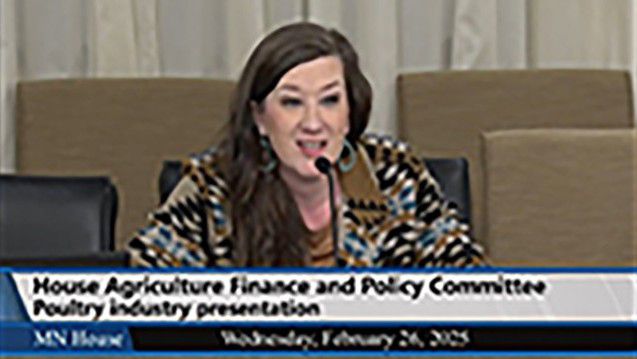 Sawatzke testifying in front of the State Legislature position as chair on the Minnesota Board of Animal Health, as well as speaking on a panel in Washington, D.C., and in front of State Legislature agriculture committees. “[Avian influenza] is a bigger issue now that it’s in dairy cattle and it can be found in cats. From a consumer standpoint, there’s more awareness of it than there used to be.”
Sawatzke testifying in front of the State Legislature position as chair on the Minnesota Board of Animal Health, as well as speaking on a panel in Washington, D.C., and in front of State Legislature agriculture committees. “[Avian influenza] is a bigger issue now that it’s in dairy cattle and it can be found in cats. From a consumer standpoint, there’s more awareness of it than there used to be.”
Looking to the Future
As her dad slows down in the coming years, Sawatzke is hopeful that Eric and their daughters will become even more involved in the day-to-day farming operations. “As our kids continue to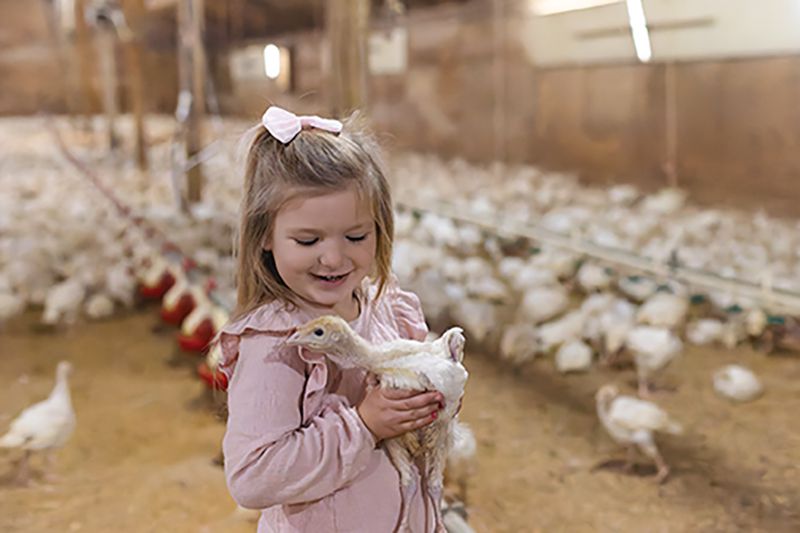 get older, hopefully they can take on a little bit more responsibility and we can keep feeding their passion [for farming],” she says. “We feel very fortunate that we get the opportunity to raise them on a farm to learn that responsibility and take care of something else besides yourself. I think it’s so important that they know what we do, but also that they’re proud of it.”
get older, hopefully they can take on a little bit more responsibility and we can keep feeding their passion [for farming],” she says. “We feel very fortunate that we get the opportunity to raise them on a farm to learn that responsibility and take care of something else besides yourself. I think it’s so important that they know what we do, but also that they’re proud of it.”
Sawatzke hopes for a thriving future on the farm, encouraging everyone to eat more turkey. “I grew up with my family always trying to promote the industry, and I continue to do that. Not only is it healthy for you, but it helps support farmers like myself in our state.”